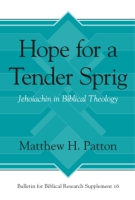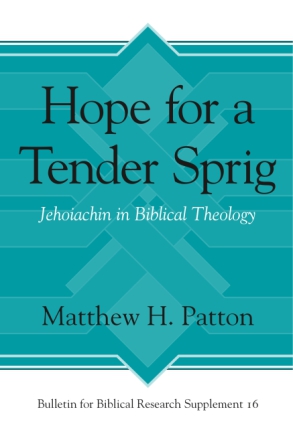Hope for a Tender Sprig
Jehoiachin in Biblical Theology
Matthew H. Patton
“A worthy contribution to OT scholarship on Jehoiachin and biblical theology of salvation history. Though the author may overstate the significance of Jehoiachin, the exegetical work displayed throughout and the trajectory these passages provide in salvation history are valuable. This reader will incorporate many insights from this book into both teaching and preaching.”
- Description
- Reviews
- Table of Contents
If we expand our purview to the Bible as a whole, another reason for investigating Jehoiachin emerges. The exile was one of the most significant events in the history of Israel. In its midst, Jehoiachin occupies an important position as both one of the last kings of Judah and one of the first exiles. Are there ways in which biblical writers capitalize on Jehoiachin’s unique position for their broader theological purposes?
Going one step further, in Hope for a Tender Sprig, Patton pursues not only the diversity of the Bible but also its unity, suggesting that “salvation history” is useful for conceiving the unity of the Bible, especially when we are concerned with a historical figure such as Jehoiachin. If the various books of the Bible bear witness to one grand storyline, what is the significance of Jehoiachin within that story? In the light of the canon as a whole, can we synthesize the various perspectives on Jehoiachin and articulate his distinctive role in this grand narrative?
These questions beg many others. What do we mean by “canon”? What grounds do we have for considering the canon as a unity, and why should we consider “salvation history” a valid paradigm for understanding it as a whole? What is the relationship of salvation history to “real” history, and is this even a valid question? What role will extrabiblical evidence (some of which concerns Jehoiachin directly) play in our investigation? Patton addresses these issues and arrives at a comprehensive biblical-theological reflection on Jehoiachin’s significance.
“A worthy contribution to OT scholarship on Jehoiachin and biblical theology of salvation history. Though the author may overstate the significance of Jehoiachin, the exegetical work displayed throughout and the trajectory these passages provide in salvation history are valuable. This reader will incorporate many insights from this book into both teaching and preaching.”
“Readers interested in a biblical theology of exile or in seeing how a biblical character may take on significant reverberations throughout the biblical text will find this work interesting and insightful.”
“Patton’s work is an important contribution to the study of the significance of Jehoiachin in biblical theology. The presentation of the biblical data (except for Isaiah) is first rate and demonstrates that Jehoiachin was not just a diminutive figure of Judah’s decline but also the one prophetically marked out as the carrier of divine promises of the nation’s future restoration.”
Abbreviations
Acknowledgments
IntroductionHistory of Research
Method
Overview
Historical Background
Babylonian Foreign Policy
The Gěbîrâ
Judean Exiles in Babylonia
Mesopotamian Imprisonment Practices
The King’s Table
Conclusion
Jehoiachin in 2 Kings
Jehoiachin in 2 Kings 24:8–17 and 25:27–30
Excursus: The Primary History as a Literary Unit
Narrative Analogies to Jehoiachin
Themes Pertaining to Jehoiachin
Conclusion
Jehoiachin in Jeremiah
Jehoiachin Uprooted
Hope for Jehoiachin’s Planting
Conclusion
Jehoiachin in Ezekiel
Making Low the Exalted: The False David Deposed
Making High the Low: The True David Exalted
Conclusion
Jehoiachin in Persian-Period Scriptures
Jehoiachin in Chronicles
Allusions to Jehoiachin in Haggai and Zechariah
Jehoiachin in Second Temple Texts
Septuagint
2 Baruch
Josephus
Targums and Rabbinic Traditions
Conclusion
Jehoiachin in the New Testament
Matthew 1:11–12
Luke’s Genealogy of Jesus
The Parable of the Mustard Seed
Conclusion
Jehoiachin in Theology
A Salvation-Historical Approach to Biblical Theology
Jehoiachin in Salvation History
Conclusion
Appendix 1. Names of Jehoiachin
Appendix 2. Divine Oaths and Their Fulfillment
Appendix 3. Genre in Ezekiel 17
Bibliography
Index of Authors
Index of Scripture
Mailing List
Subscribe to our mailing list and be notified about new titles, journals and catalogs.




